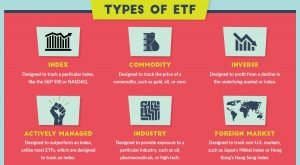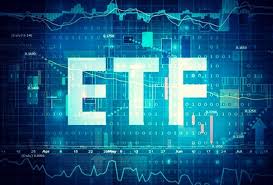An exchange traded fund (ETF) is a security that tracks the movements of an index, commodity or currency.
 An ETF is a stock – like security that trades when a market is open and allows you to enter and exit at any point in time. ETFs are generally very liquid, but it is important for you to determine if you can exit or enter without experiencing significant difficulty. There are several strategies you can use to trade ETFs including fundamental, technical and pair trading strategies. ETFs are a good way for beginners to get started. Generally, they provide a lot of diversity in the market (such as S&P 500) at little to no cost in a brokerage account. Some ETFs of the broker even provide free trades for their own ETFs.
An ETF is a stock – like security that trades when a market is open and allows you to enter and exit at any point in time. ETFs are generally very liquid, but it is important for you to determine if you can exit or enter without experiencing significant difficulty. There are several strategies you can use to trade ETFs including fundamental, technical and pair trading strategies. ETFs are a good way for beginners to get started. Generally, they provide a lot of diversity in the market (such as S&P 500) at little to no cost in a brokerage account. Some ETFs of the broker even provide free trades for their own ETFs.
What is an ETF
An ETF is a security that tracks the movement of an underlying instrument. For example, if you purchase an ETF on the Dow Industrial Average, a 1% increase in the Dow Industrial average should coincide with a 1% increase in the ETF. ETFs can be traded with leverage allowing you to trade leveraged ETFs that let you enhance your returns at 2 or even 3-times the rate of increase. For example, if you purchase a Dow Jones Industrial ETF with a leverage of 3:1, you should expect a return of 3% for every 1% rise in the Dow Jones Industrial Average. There are contracts for differences (CFDs) on ETFs that can provide leverage of up to 20:1.
The Benefits of Trading an ETF
ETF trading is usually very liquid allowing you to track an index, commodity or currency. While there are several ways to trade CFDs on commodities and currencies, there are very few ways to trade specific sectors. In addition to tracking large indices like the Nasdaq 100 or the S&P 500 index, ETFs can also track sectors such as the energy sector or the financial sector. Sector ETFs track a basket of stocks that participate in a specific sector. For example, the XLE energy ETF holds some of the largest oil and gas companies. At any time, you can have exposure to upstream producers, downstream refiners and oil service companies. If you believe this sector will rise or decline, you can buy or sell an ETF that will track these movements.
Types of Strategies You can Use to Trade ETFs
 Similar to other trading strategies, you can use fundamental or technical analysis to drive your trading decisions. The fundamentals can include the earnings in specific sectors, the macro events that effect broader markets or the supply and demand from commodities. The technical analysis you employ should be similar to the technical analysis you use on other instruments.
Similar to other trading strategies, you can use fundamental or technical analysis to drive your trading decisions. The fundamentals can include the earnings in specific sectors, the macro events that effect broader markets or the supply and demand from commodities. The technical analysis you employ should be similar to the technical analysis you use on other instruments.
Additionally, you can pair trade using ETFs. This means you can purchase one ETF and simultaneously sell another ETF. This is a relative value style of trading. If you believe that Financials will outperform technology, you can purchase the XLF and sell the XLK. You can also back-test pairs to see when they outperform and use certain technical analysis techniques to back-test your pair trades. A good way to get started is by micro investing.
By trading ETFs, you can diversify your portfolio and locate specific assets that are on the move. By using CFDs on ETFs, you can potentially enhance your performance by speculating on a leveraged position with regard to the performance of ETFs.